#to the point of creating borderline incomprehensible narratives
Explore tagged Tumblr posts
Text
I think, OP, you are probably broadly correct about Machu and Nyaan's plot. This would be adding absolutely nothing new in the Gundam canon, since what you are describing is pretty much Standard UC Gundam Operating Mode, but at this point, assessing everything G-Quacks has done up to this point, I think you are accurately describing the themes being played with.
However - and I apologise for breaking my internal rule of not doing full critical work until something is complete but I suspect this point won't change with the final episode - those themes don't alter the fact that in terms of the artistic decisions being made to convey the story, this show is hopelessly devoted to Tomino's Gundam as a source of innate importance.
It drops its plot momentum - twice! - to indulge in extended flashbacks that could have been much shorter given what they actually contribute to Machu and Nyaan's story. It constantly throws in named UC characters who, likewise, don't add anything but are given prominence well in excess of their actual role (the asides with the Titans are especially glaring). And above all, it hinges multiple dramatic moments on the audience's ability to recognise key parts of UC Gundam iconography.
Now, that's a kind of obvious statement. There is no way this was designed to be watched by people unfamiliar with Gundam's greatest hits. But it's an inbuilt limitation: simply put, in the contention between the old and new generations, it automatically concedes the issue. The Gundam, Lalah, Char, Kycilia, Zeon, the Black Tri-Stars - if the story is deferring to this past iconography as worth spending time on, how sincerely can it argue that we need to move into a wide-open future?
As a franchise, Gundam already has a perfectly serviceable means of moving past the Universal Century. Its standard operating procedure for over thirty years has been to take its visual iconography and remix it to produce totally different kinds of story. G Gundam, Gundam Wing, SEED:Destiny, Iron-Blooded Orphans, The Witch From Mercury - these are not retreads of Tomino's Gundam, even when they go to the extent of borrowing entire plot concepts (the world-ending doohicky in the final act is nigh-irresistible, it seems). They deal with different themes, different dramatic structures, and different moral questions. Tomino himself has come back twice to take his own stab at moving beyond the basic premises and iconography of the UC, and I'd argue it resulted in some of the best pieces of Gundam fiction out there (well, Turn A is; G-Reco is at least extremely pretty).
So what therefore is gained by creating a show, in 2025, that drapes itself in the Universal Century to the point of being borderline incomprehensible without a grounding in the original Gundam (your mileage may vary but my non-fan partner was definitely getting lost/bored even in the first few episodes) to convey the message 'we need to move beyond the past'?
If it's aimed at the fans who prefer the eternal continuation of the original, which has proceeded alongside the attempts to diversify Gundam as a franchise . . . then I'm sorry, the message of 'escape the past' is not going to land. It simply won't. It never does.
And if that *isn't* where this is being directed, if it is just using the UC as placeholders for an older generation that the younger must escape out from under, without being a commentary on Gundam as a whole? Then it is fatally beholden to the past anyway. Because, again, it hinges importance on people recognising and appreciating that past, often to a higher degree than the present.
G-Quuuuuux is not slop. It is a tightly constructed, well written narrative that clearly has a goal in mind and an artistic vision for how to 'do Gundam'. At the same time, it is riven through with an abiding love of the UC Gundam and a gleeful delight at being able to play in that toy-box. I guess we'll find out next week exactly how well those two aspects can be meshed together in the final outcome.
But I personally remain extremely dubious that telling this story in this way adequately conveys the message that you believe they are going for. And that's as much a technical criticism as it is my knee-jerk reaction to being bombarded with iconography taken out of the context where it actually meant something.
Also as a more serious post I keep seeing claims that Gquuuuuux is telling a story about Gundam or is doing “uc slop” or sudden rebuild bullshit in the last five eps but no it’s not. It’s telling a story about two possibly three teenagers proving that they have the right to decide their own destinies and not be bound by what the older generations have decided for them. It’s just that it’s achieving that by using the most iconic parts of Gundam to represent the older generations.
The UC “bullshit” is the culmination of the shows thesis about how the newer generations need to be left free to chart their own paths. Nyaan and Machu represent two ways in which younger people live with this. Nyaan aimlessly floats through life without convictions or passion for what she’s doing, her only wants restricted to her needs while she pines for what she truly wants but is unwilling to grab it until her hand is forced, and Machu is raging against the bonds holding her with no regards to what happens if she breaks free, she just knows she needs to be free becuase that’s worth whatever she’ll lose in the process. And then if I’m right about Shuji (and even if I’m not the earlier stuff with the red Gundam still fits) he’s the total loss of identity outside of the older generations wants and needs he no longer has his own id or ego he’s subsumed by the older generation and mirrors them (like those kids whose parents never made it in sports or whatever but they “totally could’ve” so the kids are forced to push themselves to the brink no matter what they actually want to enable their parents need to vicariously live through them.)
The fight against RX-78 isn’t just them fighting to prove their universe’s inherent right to exist but also the younger generations right to chart their own paths. This is why Challia and Kycilia’s treatment of Nyaan and Machu are so contrasting, Kycilia impose her own values and beliefs on Nyaan and Nyaan fights against them, she used the gun she was given to protect her self to protect someone else finally choosing what she wants rather than floating along. While Challia gave Machu the freedom to do what she felt was necessary and her gun was used to free herself and the Gquuuuuux to not only achieve what they wanted but to reach their full potential with the omega psycommu. It’s the same reason Challia doesn’t want to kill Xavier. he let Xavier go the way he wanted to and do what he felt was necessary and even though they’ve ended up on opposite sides he doesn’t want to take that freedom away from him in death. Whereas Kycilia was fully willing to kill Nyaan as soon as she didn’t align with her beliefs. And I think this is partly why Challia was chosen and written the way he is. He’s not an icon of Gundam like Char, Lalah, Kycilia, Amuro or even the titans. He’s of the og series but isn’t bound by it, it’s why he can straddle the line of being of the older generation but not trying to bind the newer generation to what they decide and be the only one willing to let them have the freedom they deserve.
The RX-78’s appearance is the manifestation and climax of this, the gquuuuuux timeline isn’t doing what it’s supposed to so it must be destroyed. This isn’t a show about Gundam, its not a meta story about Gundam needing to move past the UC timeline, it’s a show using the most iconic example of the old generation that Gundam will ever have to be the final boss in Nyaan and Machu’s journey to prove that they have a right to decide their own destinies. It’s why Beyond the Time works so well at the end of ep 11, it’s not only a callback but a call to arms for Nyaan and Machu to change their destiny and futures and share the happiness that’ll come from being finally, truly free.
61 notes
·
View notes
Text
i really wish more writers (tv shows) would take more time developing characters instead of looking for literally any excuse to have them trauma dump their worst fears and spell out their basic motivations to anyone who will listen every fifteen minutes
#they're always one 'how was your day?' away from a nervous breakdown#'i'm just so exhausted'#I BET YOU ARE#like man i hate to recommend that you just repress some shit but at this point maybe that's the move#you have five seasons to sort through this shit you don't have to do it all RIGHT NOW it's only episode three my friend#i know i'm super biased towards 'less is more' writing#to the point of creating borderline incomprehensible narratives#but like#i still really feel like we could all relax and be a bit more mysterious here#if you're routinely having more than one major breakthrough every episode you should probably slow down that's all i'm saying
2 notes
·
View notes
Note
Even when ignoring the games and judging idw sonic on its own merits, it's just not a good product. Idw sonic is one of the most boring and shallow comic books I've ever read. Every concept gets ruined beyond salvation. The story is always disagreeing with itself and refusing to go anywhere. Every character is either a plank of wood or unforgivably annoying. The visuals and scenery are woefully forgettable.
I honestly can't tell what the point is. From a business standpoint, the answer is obviously money. But from a creative standpoint, what's being done here? Are the writers and artists getting any enjoyment from creating such banal slop? Is it fun to spend so much effort creating a story that doesn't function in any way whatsoever?
That's not even getting into how mediocre idw sonic is compared to actually good comics. And even if you go only by comics under idw publishing the idw sonic comic still falls short.
Read any non-sonic comic published by idw then go back to idw sonic. The difference in quality and entertainment value is staggering.
Idw sonic has no value and the atrocious writing choices make zero sense.
Yeah exactly.
It being a disrespectful toxic blight upon the Sonic franchise is why I HATE it, but it's still a completely irredeemable heap of trash even if you just treat it as its own standalone product. And like I've said before the comic is INCOMPREHENSIBLE GIBBERISH if you do not have a pre-established familiarity with the video games. So even if you're completely ridiculously unreasonably generous and go into the comic with full knowledge and awareness of the video games in mind so that you know who everybody is because the comic never explains or introduces anybody, and even if you accept for the sake of argument that the status quo of the series is what the comic says it is even though the comic never demonstrates it and nothing from the video games supports its assertions - the comic STILL completely FAILS as a narrative.
The characters do not act consistently with their established characterization within the comic nor with their previous deeds and stated beliefs. There is NO character development, for ANYONE. There is no world building to speak of, I legitimately have no idea where the fuck the comic is even supposed to take place or where anything is in relation to anywhere else. Everybody constantly acts like a complete moron in order to facilitate plot contrivances that aren't interesting or entertaining. There's no thematic concepts or insightful commentary to be found, the closest the comic gets to anything of that nature is meta textual interludes that make zero sense within the context of the universe and are only included for the sake of shouting "THOSE SONIC VIDEO GAMES SURE ARE STUPID AND DUMB AMIRITE?" to the audience. And the art has degraded to the point of being absolutely nauseating to look at with the sequential flow of events being borderline impossible to follow along with.
This comic is unreadable garbage. The ONLY conceivable POSSIBLE way ANYBODY could derive ANY enjoyment from it whatsoever at this point is if they HATE HATE HATE the Sonic video games and the comic serves as an outlet for them to hold aloft and proclaim it to be superior to the video games. In the same way some fifty year old divorcee will go to bars and try hitting on twenty year olds by telling them how much hotter she is than his ex wife.
This comic cannot be cancelled soon enough.
8 notes
·
View notes
Text
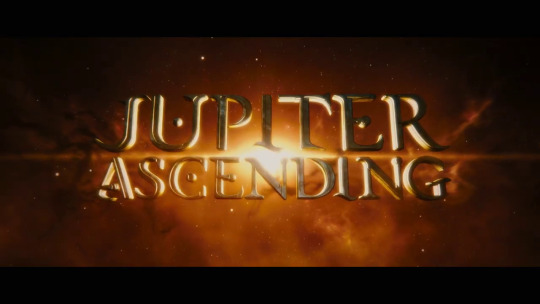
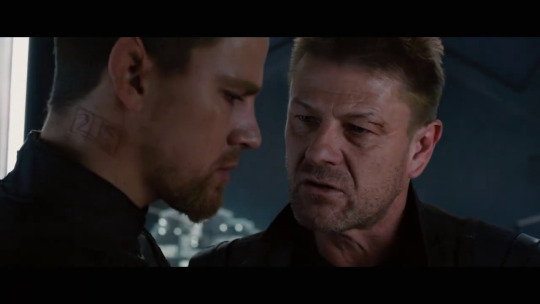
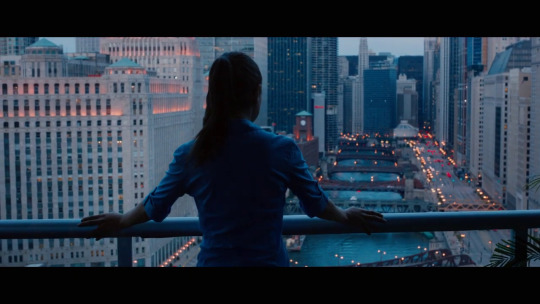
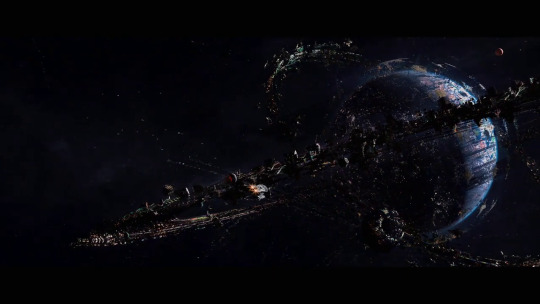
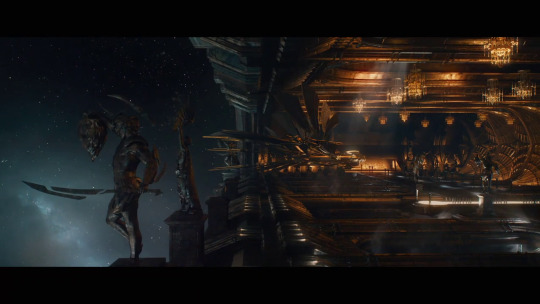
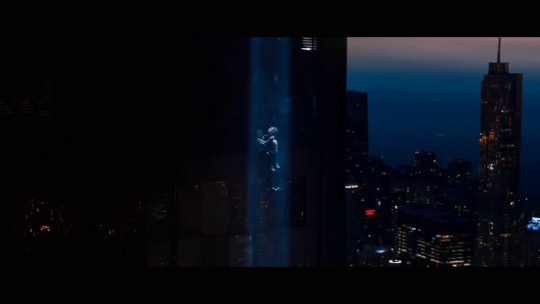
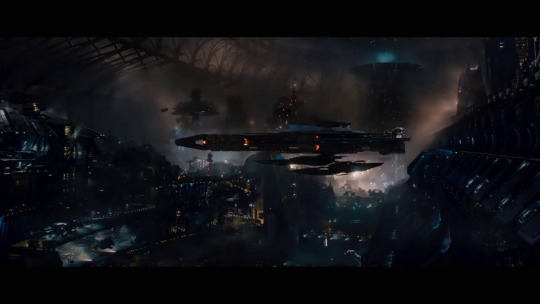
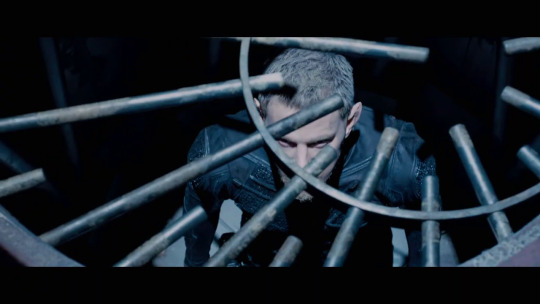


Jupiter Ascending (2015)
Film review #651
Director: Lana Wachowski, Lily Wachowski
SYNOPSIS: Jupiter leads an ordinary life when she is caught up in an interplanetary struggle when it turns out she is the genetic reincarnation of the head of the most powerful business in the galaxy, and inheritor to a vast fortune. Caught up in a battle for the inheritance of her supposed genetic double, Jupiter has to figure out who she can trust as she is kidnapped across the galaxy by those who want her inheritance for themselves.
THOUGHTS/ANALYSIS: Jupiter Ascending is a 2016 sci-film. An ordinary woman discovers that she is the genetic reincarnation of the head of the Galaxy's most powerful empire, and is caught up in the struggle for control of it between three siblings. A simple enough story in theory, but let us set the tone here: it is bad, and borderline incomprehensible. Obviously the film is trying to capture the feeling of the main character being introduced to a galaxy which she has not known anything about, but there has to be some way for the viewer to be able to follow what's happening too. What we get is just Jupiter being passed back and forth across different planets, spaceships and the like, with no real sense of place or establishing where in outer space we are at any given time. The film is constantly interrupted by characters having to explain things to Jupiter, meaning we have to suffer through it as well. The film obviously wants to create an expansive universe, but it really sweats the small details to the point that information overload sets in, and the explanation never applies to anything from that point on. The whole scene with the bees recognising Jupiter in the sense that bees "recognise royalty" was so unbelievably stupid I don't know where to start: they could have just written any other way to show her status, but to do it with bees raises far too many questions: do bees not sting human monarchs as well then? It doesn't matter, because it is never referenced again after it's unceremonious one-time use. The film has some expansive and detailed CG effects, and the action scenes have a certain pacing, but always resolve themselves the same way: with Cain saving Jupiter at the very last second. By the fifth or sixth time it happens it's so predictable the whole fanfare around it is just wasted. Also, Cain has these anti-gravity boots that he constantly uses in his action scenes to fly about, but apparently no one else in the galaxy has access to these things as they are left running about on the ground after him? The Wachowskis bring in their conceptual exploration of transhumanism and discovering who you are as they typically do, but there's no depth to it or interesting exploration; it's just more explaining minutiae that drags the film down into getting stuck on little details that don't matter.
The film is supposed to have this overarching love story between Jupiter (Mila Kunis) and Cain (Channing Tatum), and how Jupiter has never been in love because her Mother taught her never to get close to anyone or something. There's the germ of a narrative here, but it's hampered by another of the film's huge problems: the characters never becomes proper characters. Everybody in the film just feels like they can't settle into their roles, and as such you only recognise the actors just being themselves. These are all fairly competent actors, so they know what they're doing, they just aren't given anything tangible or unique to work with. As such, any chemistry or character development is severely limited. By far the most obscene performance is Eddie Redmayne as the villain Balem Abrasax: he constantly talks in this low whisper which makes him impossible to take seriously. His role is so over-acted that it's distracting from anything his character does. In fact, his character disappears for nearly all the film, so he's not really all that important. The rest of the cast are Sean Bean being Sean Bean (although his character doesn't actually die) and others that barely make a scratch in the film. The crew of the spaceship Aegis have a supporting role, I'm just not sure what it is, due to the constant moving around different planets and locations across space mentioned, it's hard to keep track of just what is going on and what their motivations are.
The film does have some good CG effects and the otherworldly locations are rendered with good detail and a graspable scale. Unfortunately, that is the only positive I can really take from this mess of a film. Jupiter Ascending is a mess of poorly structured plot, ill-defined characters, and bemusing performances that nowhere near fulfil the concepts and narrative themes they are attempting to develop. Every action scene playing out essentially the same even drains the film of any entertainment value. I simply cannot recommend this film in any way.
0 notes
Link
This is time that was allotted to these storylines by canon, offering an expectation of meaning and importance, offering what results in a promise—not time the fans imagined or made up, not something they feel nebulously entitled to, but time they spent on plots the canon gave to them. (Cas means something to Dean after all these years and a love confession. Bucky means something to Steve after all these years and a snap. Jaime’s project of growth and his meaningful relationship with Brienne is something worth investing in.) But instead of saying, yes, you spent all this time watching these scenes, feeling these moments, taking this in—you grew with this character, with these relationships (grew in many cases away from the set starting point)—here is your promised meaning, again and again, these properties snatch the rug away and then pretend blithely they cannot understand why “entitled fans” are so upset.
I’ve been meaning to write my version of this argument for a while now, and I suppose this article is just as good a reason as any.
My thesis, in short, is that lack of queer representation actually isn’t what is creating ~the problem~ here. What’s creating the problem is the overriding power of heteronormativity as a kind of ‘trump’ story logic that is allowed to steamroller everything else into oblivion. (And yes, there actually is a substantial difference between those two things)
Sub-thesis 1: Representation Actually Isn’t A Strong Argument for Destiel (or any particular ship/character)
Controversial, I know. The representation argument (while an extremely valid argument as applies to popular culture in general) is actually not a very good argument when it comes to why Dean should be explicitly queer and Destiel should have been consummated.
For one, there’s no reason -- exclusively from the standpoint that it is a moral imperative that queer people are represented in media -- why any particular character or set of characters should be that representation. The ethical cultural mandate to represent marginalized groups does not mandate that any one character or set of characters in any particular given story be that representation*. Yes, even if you as a member of that marginalized group happen to identify with that character. Even then, it isn’t OWED to you. (I think writers should take those trends of identification seriously, and think about what it means to marginalized groups, and act accordingly. But I don’t think it creates an OBLIGATION)
*I’d argue the primary caveat to this would be in stories where the character’s situation or arc is directly related to struggles experienced by that marginalized group (i.e., casting mostly white actors in stories where those characters are experiencing racial oppression)
For another, if representation of queer characters were primarily dictated by fandoms, 90% of queer characters in media would be white, conventionally attractive men. (That might be overstating it a bit, but fandoms have serious biases when it comes to shipping and what kind of characters they latch onto for queer interpretation, and that’s one of the reasons I’m grateful queer representation is not primarily linked to our tastes/preferences).
The representation argument is a very valid argument when examining popular culture as whole, and when looking at broader trends for example, within a genre, or a whole network. But no particular TV show is obligated to make particular characters within it queer just because representation is a moral imperative as a broader cultural issue.
Sub-Thesis 2: Heteronormativity Creates Stupid/Badly Constructed Stories
The actual problem here is how heteronormativity creates a kind of trump logic that overrides coherent storytelling.
I’m not upset about what happened on Supernatural because I think we missed out on representation. There is actually plenty of ~better~ representation elsewhere, and there will continue to be more as time goes on. The representation issue is peripheral at best when it comes to analyzing what went ‘wrong’ with Supernatural.
The key issue here is that stories need to make sense, not just in terms of plot (although that matters), but in terms of character growth, emotional arcs, etc. The ending of Supernatural is bad because it treated massive pieces of character growth and one of the most significant emotional arcs of the whole show as if it was ultimately inconsequential -- which is bad storytelling and doesn’t make sense.
And YES, we are ‘owed’ stories that make sense. It’s not entitled to want a story to be coherent, because coherence is what makes a story a story, and not just a series of random meaninglessly assembled plot points/fictional anecdotes.
The problem is, Hollywood writers keep writing themselves into situations where emotional coherence basically requires an explicitly queer dynamic (or at least a strongly subtextual one), and then just being like...but these characters aren’t queer so we can’t do that. Instead, let’s end Steve’s arc by sending him back in time to live a heterosexual life with Peggy, disregarding the HUGELY significant plot points related to Steve/Bucky which grounded multiple entire movies within the MCU (Winter Solider, Civil War). Let’s end Sherlock by inventing a random, long-lost Holmes sister never remotely hinted at or foreshadowed and make that incomprehensible plot point the finale, when the entire series has been grounded in John and Sherlock’s relationship.
Let’s make it canonically clear Cas’s love for Dean is the one single act of pure free will in a world with a malevolent God trying to manipulate everyone’s lives for his own amusement, and that Cas’s love for Dean is the only thing keeping the primary story-universe of Supernatural intact, because every other version of Sam and Dean in every other universe kill each other as God intended. Let’s make it clear that Cas’s betrayal of heaven due to his love for Dean is literally propping up their entire universe, but then end the story by pretending like it’s not that important after all. Castiel who?
And it’s just like...THAT DOESN’T MAKE SENSE! It doesn’t make fucking sense. It’s bad writing. So why would you do it? (I mean, I being a bit facetious here. I know exactly why. Because the precious feelings of homophobes will be hurt, and companies don’t want to lose out on their money)
It’s not entitled to want a story to make sense. It’s not entitled to want major plot points and character arcs and emotional dynamics to have resolutions that follow from what came before in the story.
And I’m sorry, but you are a ridiculous person if you watched Dean grieve Castiel’s ostensible deaths in s7 and s13 (both times becoming nearly catatonic, nihilistic, more self-destructive than usual, and borderline suicidal over losing Cas) and try to argue to me that his shrug-it-off attitude towards Cas’s death/loss in the finale makes any goddamn sense at all.
It is utterly inconsistent with everything that has happened before in Supernatural regarding Dean and Castiel’s relationship. It’s incomprehensibly incoherent and just stupid. (And that is just the absolute tip of the incoherence iceberg because to fully explain why the ending of Supernatural re: Destiel doesn’t make sense we’d have to review over 300 episode’s worth of content, and there isn’t time for that)
I’m just so sick and so tired of being asked to pretend to be stupid because you know, man, heterosexuality. They’re not gay!!1!
The exhaustion I feel, as a queer viewer, in fact is not borne out of lack of representation. The representation issue is very much on an upward trajectory and I’m not worried about the future of TV not being queer enough. I’m not.
The exhaustion and frustration and anger I feel as a queer viewer is borne of having to repeatedly watch stupid endings to good stories because the story can only make sense if you make it queer (you cowards). I’m tired of being asked to develop dumb amnesia disease in order to consume endings to stories that had to blow everything up at the end to (re)enforce a heterosexuality that can only stand on a foundation of utter incoherence and contradiction to monumental things that came before it.
I am JUST SO TIRED of being asked to sacrifice my intelligence, my basic logic and critical thinking skills, and my ability to remember basic narrative beats at the alter of almighty Heterosexuality, supreme ruler of all cultural output and destroyer of good queer things.
Heterosexuality isn’t owed my stupidity, and I’m not entitled for wanting stories to make sense. YOU are entitled for demanding my stupidity when you wrote that dumb shit and expected me to act like it wasn’t dumb simply because it was heterosexual.
No, the heterosexuality is exactly the reason it IS dumb.
896 notes
·
View notes
Note
(Okay head’s up, I’m going to be on your blog a lot since I absolutely LOVE your takes and analysis’.) Do you think (strictly theatrically speaking, not in the non-fictional and historical sense) Suleyman really loved Hürrem? As I watched the show I found it very silly how other characters of the show would remark how Suleyman “loved Hurrem so much he refused to ever take another concubine again” because..he did? And multiple times from what the viewers have seen too. Majority of the times the concubines/other women in Suleyman’s life (Isabella, Firüze etc) were only removed from his life via Hurrem’s intrigues, not by Suleyman’s decision. What do you think?
Aww, thank you so much for the nice words! 💕 Be here as much as you wish, absolutely no problem! (there are some takes I've had in the past that are quite passive-agressive in retrospect 😅, so I might as well also give you a heads up.)
As for your question, I think yes, SS loves Hürrem, but in his own, sometimes honestly incomprehensible (even outright toxic), way.
The writers perhaps wanted to hint at love at first sight in the beggining, due to the way she fainted in his arms in the first episode and how he kept thinking about her (that Ibrahim had to tell him that where he was supposed to go was the other direction) and the wave of excitement and anticipation he felt while waiting for her. But when they spent two nights together and he truly got to know her, was where it was at. Her uncanny ability to make him laugh, entertain him in a way no one else had before, was what impressed him first. He felt calm, safe in her presence, and wanted to keep this probably forever, along with him doing whatever else he wanted in the meantime regardless.
I feel the point of contention of whether he truly loved her or not comes from the fact that, the show wanted to make their love story integral to their both historically thematic and narratively soapy story - what I mean is, they wanted to make it the central plotline. And as a central plotline, it creates and/or extends on the other plotlines, having to show the other characters' reactions in excessive detail and even center parts of their motivations around it. You see how S01 and S02 of the series played this aspect of Hürrem and Süleiman's story completely straight - it presented it as The Love, this big, (thematically and narratively) unprecedented thing, this vital aspect of the series' DNA, the very tool that moves the story forward, that is only bound to have consistent narrative opposition: and I'm not referring only to Isabella and Firuze and all the other concubine arcs that force love triangles suited for the genre, it all is also about the continuous, frequent attacks on their love, that only stopped when the show made a complete genre shift by the second half of S04 and didn't have much time left. They worked with the idea that the more this love is attacked and antagonized, the stronger it becomes and the more shall people root for it. That's where the problem comes, because in retrospect, you can honestly see that these attacks played a major part in provoking a bunch of stuff SS did for Hürrem. Mahidevran beating her to death and poisoning her? SS gives Hürrem a chamber only for herself. (the other one she shared with Ayşe.) Them accusing her incessantly? Valide complaining about her? The various attacks? He continues to care even more for her. Valide and Ibrahim arranging that attack with the bandits? He married her. And one would wonder: is this even genuine or does the writing simply use her enemies' failings to lead Hürrem to SS? Is that the only reason he actually cares? What does MC want to achieve?
There are people who say that the entire point of SS loving her was that she was so different from everyone else (and that the concubine arcs ruined it), and yes, it was like that, in the very beginning. First impression is important and he truly began to enjoy her a lot since their first two nights, for her bringing him something new. However, both of Hürrem and Süleiman's characters and their relationship overall, drastically evolved throughout the show. When the first impression had passed and Hürrem gained SS's utmost attention and she became pregnant, she very quickly started taking stuff for granted, considering him only hers (the demonstration of the ring in front of Mahi; the twinge of jealousy towards Ibrahim.) and as a parallel, him still being a Sultan, having to follow the customs anyway, and calling Gülnihal in his chambers twice. Both of their ways of living clash, because Hürrem wants a monogamous relationship and takes every sign of care for him at face value, while SS lives in an environment that wants him to do what is expected of him.
SS both loves and hates when Hürrem stands up to his will. There have been times where she acted rashly, making borderline silly accusations (like blaming little Mustafa for the fire in E10), where she made moves out of jealousy (like stealing Isabella's pendant) and where she was complaining to him for something she didn't succeed to get (like Valide's chambers in S03). Süleiman sees her rebellious nature and goes out of his way to do moves to spite her. (this guy invited Isabella on a halvet out. of. sheer. spite and nothing else! smh honestly..) But there are as many times where he simply covers what she did (like killing Isabella) and caves to her demands anyway! Why would he cave to her demands and close his eyes on so much stuff she did, if he doesn't feel at least something for her?
The different treatment she gets also comes into play, because no matter how many times she's attacked and he seemingly stood by and watched aside from more serious cases, all it honestly does, is trigger his protective instincts. Despite of all the bumps on the road, Hürrem always was his darling, his special snowflake, whom he clearly felt something for. If anything, he wouldn't have freed her and this isn't something he would do to just anyone. (as we see how he refused to free Mahidevran when she desperately begged him to in E45.; and what's important, him freeing Hürrem wasn't provoked by someone else attacking her.) And when she makes all these jealousy fits, he listens, because Hürrem's character development represents full adaption to the circumstances of the harem, and by that, getting just like the others and learning their tricks. This has turned him off numerous times and when she shows that rebellious side of hers yet again, he couldn't help, but listen. What he said to Ibrahim after he sent off the Russian concubines, is especially telling: "No. (I don't love Hürrem as much as she loves me.) But now I fell in love with her even more." This summarizes extremely well what he thinks of her at this point, because while he's ready to cut her some slack, he's still helpless to her.
Though, later down the line, it gets very abundantly clear that if he loves her, he doesn't love her because she's different and she's rebellious, but because she's loyal to him. Infinitely loyal. She loves him this much, that she's not only ready to willingly drink poison and kill herself for him anytime, but she doesn't even want to give up his throne. It is all very well highlighted by his infamous line to Fatma: "Hürrem is not an angel, but she has something that none of you have. Loyalty! Absolute loyalty... / "She never saw anyone else on the throne but me." Over the years, SS began to live with the dramatically increased paranoia of betrayal, turning his natural ego from a strength, to an everlooming weakness. It destroyed every single relation of his, except for Hürrem. She's the only person that wasn't targeted by this crippling paranoid fear, he perhaps found piece and tranquil in her presence, because he knew that she wouldn't ever turn her back on him. And all these times he got mad at her, he had halvets to spite her, he caused her to prove to him how much he loved her, it turned out to be not only because his ego was tempered with, he wanted to test her loyalty the entire time. And all the times he prevented her from digging deeper into him and told her to stay out of political matters, now in S04 he no longer does that, since she actively joins every single conversation. Hürrem and Süleiman's relationship was put in a thorough deconstruction in S03 and S04, because after the slow Cerebus Syndrome transition began occurring and Yılmaz Şahin fully took over the script, the narrative stopped playing the love story completely straight and it put in the impression that it isn't focused on as much as it was before. So its more problematic aspects began showing even more down the line and it all lead into this very realization. The last episodes of Hürrem's life, while seeming like a cop-out, are genuine love letters for the fans and for Hürrem, with having Süleiman realize who he will lose and what will happen next, giving her the attention he never did. (I think the best Hürrem and Süleiman scenes we got, were in these episodes, along with the ones in the beginning episodes and right after the wedding, in E43-44.)
[And the episodes after Hürrem's death also make us question whatever he cares for her, because all he did there was straightforwardly betray her dying wish. Still, we should keep in mind that SS was at the peak of his downward spiral and it was Hürrem's death that sealed everything for him - losing the person who loved you dearly and was the most loyal one to you in your book, only caused catastrophic and devastating results, with SS going in her chambers in E136 and begging her to forgive him, right before the big fight between Selim and Beyezid began. There is everything else he did, yes, but losing HER is what caused him the truly neverending misery and what pushed him to such extremes, the loss of her loyalty broke him and finished him.]
Isabella and Firuze and Nazenin also add to these tests of loyalty, as well as being love triangles, added in for the drama. I feel SS did this not only to spite Hürrem, but also because he liked her unpredictability and he truly never expected for her to be this loyal in his eyes. It is possible he thought at some point due to his paranoia that she would give up on him, betray him, knowing that she also has her own ambitions. But seeing that none of that happened... perhaps all these continuous rifts in their relationship strived to show how strongly she loved him after all and maybe he came to appreciate that, even if it were too late. {note: the others said that SS loved Hü not exactly because of him refusing to take in concubines, but rather not taking concubines in for a long time. It illustrates more their hopes and beliefs (Mahidevran in E61: "Did you really think that his majesty couldn't be with other women?") and arguments presented when they need to win someone over for their cause to get rid of her. (like Hatice with Afife in S03) I always considered the Firuze arc more of a thematic tool than a dramatic one: aside from showing an actual continuous rift between Hürrem and SS, it breaks Hürrem's season two finale victory in half, enforcing even further that there isn't just any true long lasting victory that the themes won't condemn in this franchise. Nazenin was more for the parallels (Nurbanu - Nazenin; Hürrem - Gülnihal), while I never fully figured out what Isabella Fortuna was for, tbh.}
{He regarded Isabella as more of a toy, unfortunately, even with him saying that it was all somehow "a political game" with her and we had only him succumbing to his "manliness", protecting her from the snake and inviting her to a halvet only to spite Hürrem. With Firuze it was, admittedly, a bit more complicated, because he sure was infatuated with her to some extent, recited the exact same poetry to her, as well, but then again, we have the poisoning as a factor, and we have no idea to what extent it began to affect his psyche, besides him having to lay in bed in E78. I don't think Hürrem's intrigues had anything to do with the feelings he had for both of them, and I believe he would at some point have let them all go, exactly due to his ego and loyalty complex.}
I don't say that Süleiman's love for Hürrem is a healthy one, because oh noo, IT IS NOT, very far from it, in fact. Especially with the writers still keeping the status-quo with them the exact same even after he freed and married her, and for a while, it never made an actual difference. However, it is something that he didn't feel for anyone else in this harem and I would say that he indeed cherished it a lot.
#magnificent century#sultan suleyman#sultan suleiman#hurrem sultan#isabela fortuna#firuze hatun#ask#stuffandthangs#long post
41 notes
·
View notes